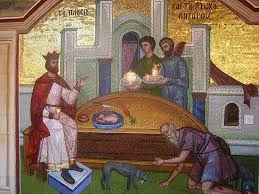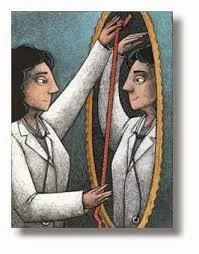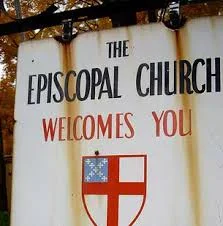Today marks the fifth straight week we’ve heard a parable from Jesus in our Gospel lesson. Last week, I mentioned that when we hear a parable, we have to be careful not to treat them allegorically, where we assign a direct one-to-one correlation to each character in the story. The danger in approaching parables this way is that we can hear one and conclude that it doesn’t apply to us. Given their ancient context, and Jesus’ tendency to use hyperbole to make a point, sometimes it can be difficult to find their relevance for us here and now.
Today’s parable of the Rich Man and Lazarus is a good example of this. On the surface, I cannot directly relate to the experiences of the Rich Man or Lazarus. As described in the story, they are both “other” to me. The risk we run when we discover that “we” are not in the story, is that we then use the story as a means for self-righteously telling other people how they should live and act. And this lack of self-examination is exactly what Jesus condemns in most of his parables.
So the task we have as Christians when we hear this parable is to discern what part of us is the Rich Man, and what part of us is Lazarus. It is not an either-or, but rather a both-and. You have heard me say before that a good sermon should comfort the afflicted and afflict the comfortable. And the same goes for parables. In today’s parable, the Rich Man in us needs to be afflicted in such a way that we repent and are transformed. And the Lazarus in us needs to be comforted in such a way that we recognize that even when others might ignore, overlook, or misunderstand us, God never does.
Most of the commentaries and sermons I have read and heard about this parable focus on how we should be more hospitable and generous to the poor in our midst. And this is especially the case when it is paired with the lessons from Amos and 1 Timothy. And that is certainly a faithful reading of the text. And until all of the hungry are fed, and all of the homeless housed, there can never be too many sermons on caring for the poor.
But today I’d like us to look at this parable from a different angle. Rather than focusing on Lazarus’ poverty, I’d like to focus on his medical condition, and his inability to get the help he needs. I think that this predicament is something that most of us can directly relate to, whether it is from personal experience, or the experience of a friend or family member. How many of us have had something wrong with us – whether it is a physical ailment or an emotional one – and not been able to get the help we need? It is a terribly helpless feeling to go to the doctor and have him or her tell you, “I can’t find anything wrong with you” or “I can see that something is abnormal, but it’s a mystery to me as to what it is, or how to treat it.”
Now just like any profession, there are wonderfully compassionate, empathetic medical and mental health professionals and there are those who aren’t. And just like in any family or group of friends, there are those who are wonderfully compassionate and empathetic, and those who are not. But my experience has been that when someone is sick or injured – physically or emotionally – what they need as much as anything is to be noticed. They need to be noticed they need to be seen - by their medical care givers, their co-workers, their family members, and their friends.
According to our parable today, the sin of the Rich Man wasn’t the fact that he was rich. His great sin was that he failed to notice Lazarus as he passed him by every day. He didn’t see Lazarus. To the Rich Man, Lazarus either didn’t exist, or he was just like the neighborhood stray dog. And that is why the Rich Man didn’t inherit a blissful eternal life. That is why the tables were turned in the afterlife – and the Rich Man’s needs would go unnoticed and unmet for eternity.
One thing clergy, mental health professionals, and social workers are warned of is compassion fatigue. If we’re not careful, we can get burned out from caring so much and so often. The needs of our communities are endless, and no one person, no one church, and no one agency can fix all of the problems with which we are faced. So if we’re not careful, we can begin to grow callous to the needs of others, because we simply get overwhelmed. Perhaps the Rich Man, early in his life, was more compassionate and empathetic, but then grew weary once he realized he alone couldn’t meet the needs of his community.
Just like last week, and really, the past several weeks, we have been given some very provocative lessons to read, mark, and inwardly digest as we are beginning this season of stewardship. One thing that I would like to challenge us to do this coming year for stewardship – and you won’t find this one your pledge card – is to make a pledge to notice someone who perhaps has gone unnoticed. Make a pledge to see someone who has gone unseen. Make a pledge to hear someone who hasn’t been heard. This could be a family member, someone at work, or someone in your neighborhood. And believe me, I am holding up the mirror to myself when I am saying this. I am terribly afflicted by this parable as I reflect on those who I don’t take the time to visit, notice, see, or hear. But I am also comforted when I remember that as children of God, we are always noticed, seen, and heard by God. And when God sees us, God sees us as God’s beloved children, created in God’s very own image. In Jesus Christ, we have been given an example of what it is like to notice, hear, and love others. Let us follow that example, so that life in the here and now will model life eternal.










